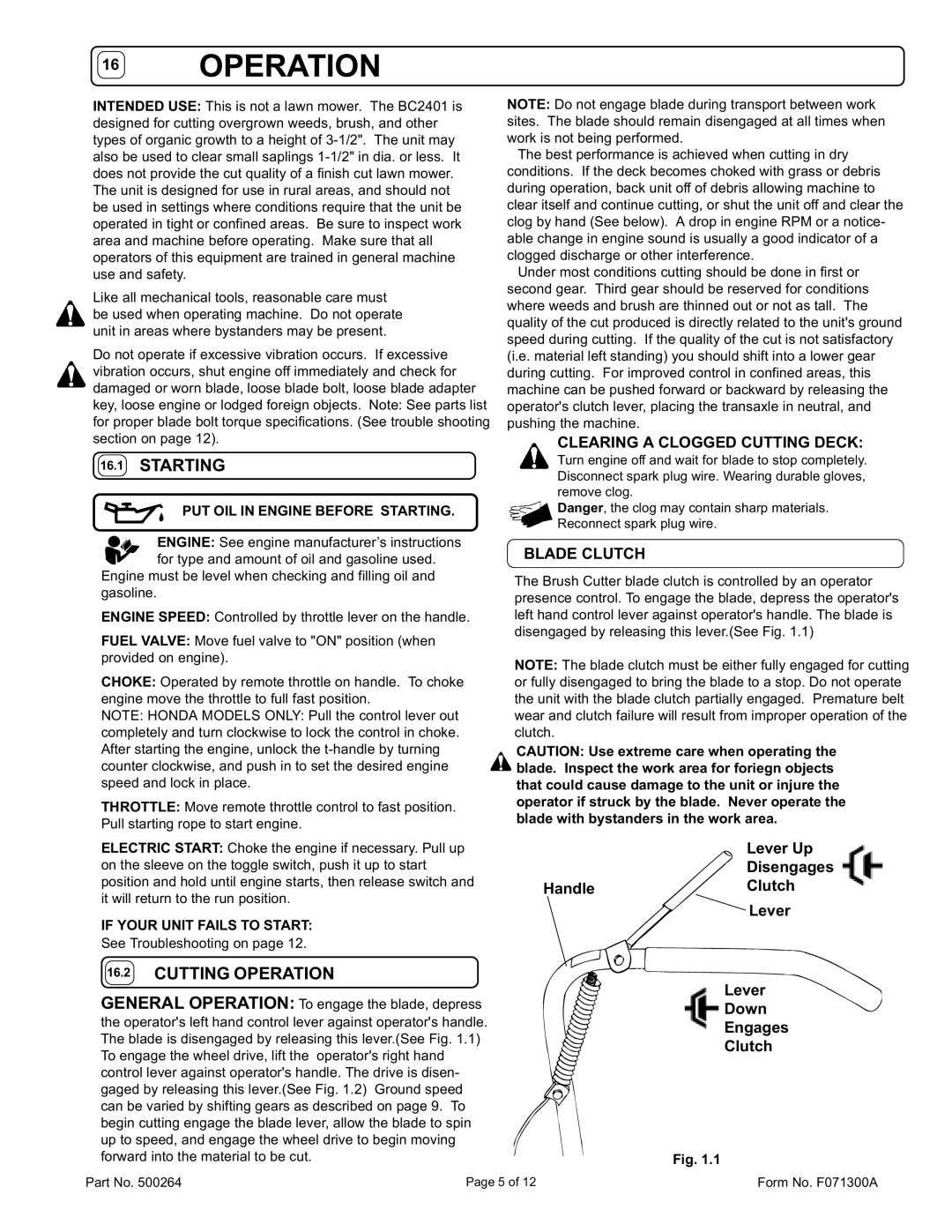
16OPERATION
INTENDED USE: This is not a lawn mower. The BC2401 is designed for cutting overgrown weeds, brush, and other types of organic growth to a height of
Like all mechanical tools, reasonable care must be used when operating machine. Do not operate unit in areas where bystanders may be present.
Do not operate if excessive vibration occurs. If excessive vibration occurs, shut engine off immediately and check for damaged or worn blade, loose blade bolt, loose blade adapter key, loose engine or lodged foreign objects. Note: See parts list for proper blade bolt torque specifications. (See trouble shooting section on page 12).
16.1STARTING
PUT OIL IN ENGINE BEFORE STARTING.
ENGINE: See engine manufacturer’s instructions for type and amount of oil and gasoline used.
Engine must be level when checking and filling oil and gasoline.
ENGINE SPEED: Controlled by throttle lever on the handle.
FUEL VALVE: Move fuel valve to "ON" position (when provided on engine).
CHOKE: Operated by remote throttle on handle. To choke engine move the throttle to full fast position.
NOTE: HONDA MODELS ONLY: Pull the control lever out completely and turn clockwise to lock the control in choke. After starting the engine, unlock the
THROTTLE: Move remote throttle control to fast position. Pull starting rope to start engine.
ELECTRIC START: Choke the engine if necessary. Pull up on the sleeve on the toggle switch, push it up to start position and hold until engine starts, then release switch and it will return to the run position.
IF YOUR UNIT FAILS TO START:
See Troubleshooting on page 12.
16.2CUTTING OPERATION
GENERAL OPERATION: To engage the blade, depress the operator's left hand control lever against operator's handle. The blade is disengaged by releasing this lever.(See Fig. 1.1)
To engage the wheel drive, lift the operator's right hand control lever against operator's handle. The drive is disen- gaged by releasing this lever.(See Fig. 1.2) Ground speed can be varied by shifting gears as described on page 9. To begin cutting engage the blade lever, allow the blade to spin up to speed, and engage the wheel drive to begin moving forward into the material to be cut.
NOTE: Do not engage blade during transport between work sites. The blade should remain disengaged at all times when work is not being performed.
The best performance is achieved when cutting in dry conditions. If the deck becomes choked with grass or debris during operation, back unit off of debris allowing machine to clear itself and continue cutting, or shut the unit off and clear the clog by hand (See below). A drop in engine RPM or a notice- able change in engine sound is usually a good indicator of a clogged discharge or other interference.
Under most conditions cutting should be done in first or second gear. Third gear should be reserved for conditions where weeds and brush are thinned out or not as tall. The quality of the cut produced is directly related to the unit's ground speed during cutting. If the quality of the cut is not satisfactory (i.e. material left standing) you should shift into a lower gear during cutting. For improved control in confined areas, this machine can be pushed forward or backward by releasing the operator's clutch lever, placing the transaxle in neutral, and pushing the machine.
CLEARING A CLOGGED CUTTING DECK:
Turn engine off and wait for blade to stop completely. Disconnect spark plug wire. Wearing durable gloves, remove clog.
Danger, the clog may contain sharp materials. Reconnect spark plug wire.
BLADE CLUTCH
The Brush Cutter blade clutch is controlled by an operator presence control. To engage the blade, depress the operator's left hand control lever against operator's handle. The blade is disengaged by releasing this lever.(See Fig. 1.1)
NOTE: The blade clutch must be either fully engaged for cutting or fully disengaged to bring the blade to a stop. Do not operate the unit with the blade clutch partially engaged. Premature belt wear and clutch failure will result from improper operation of the clutch.
CAUTION: Use extreme care when operating the blade. Inspect the work area for foriegn objects that could cause damage to the unit or injure the operator if struck by the blade. Never operate the blade with bystanders in the work area.
| Lever Up |
| Disengages |
Handle | Clutch |
| Lever |
Lever
Down
Engages
Clutch
Fig. 1.1
Part No. 500264 | Page 5 of 12 | Form No. F071300A |
